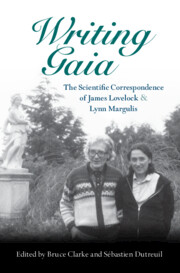Book contents
- Writing Gaia: The Scientific Correspondence of James Lovelock and Lynn Margulis
- Reviews
- Writing Gaia: The Scientific Correspondence of James Lovelock and Lynn Margulis
- Copyright page
- Epigraph
- Table of Contents
- Figures
- Contributors
- Foreword by James Lovelock
- Preface
- Acknowledgements
- Introduction
- Part I 1970–1972
- Part II 1973–1979
- Part III 1980–1991
- 1980
- 1981
- 1982
- 1983
- 1984
- 1985
- 1986
- 1987
- 1988
- 1989
- 1990
- 1991
- Part IV 1992–2007
- Part V Commentaries on Lovelock and Margulis
- Glossary of Names
- Glossary of Terms
- Bibliography
- Index
1988
from Part III - 1980–1991
Published online by Cambridge University Press: 28 July 2022
- Writing Gaia: The Scientific Correspondence of James Lovelock and Lynn Margulis
- Reviews
- Writing Gaia: The Scientific Correspondence of James Lovelock and Lynn Margulis
- Copyright page
- Epigraph
- Table of Contents
- Figures
- Contributors
- Foreword by James Lovelock
- Preface
- Acknowledgements
- Introduction
- Part I 1970–1972
- Part II 1973–1979
- Part III 1980–1991
- 1980
- 1981
- 1982
- 1983
- 1984
- 1985
- 1986
- 1987
- 1988
- 1989
- 1990
- 1991
- Part IV 1992–2007
- Part V Commentaries on Lovelock and Margulis
- Glossary of Names
- Glossary of Terms
- Bibliography
- Index
Summary
In March 1988, thanks to the initiative of climatologist Stephen Schneider, the American Geophysical Union sponsored a Chapman Conference on the Gaia hypothesis in San Diego, California. This weeklong meeting gathered a wide array of Earth scientists – climatologists, Earth historians, oceanographers, and atmospheric chemists, including Ann Henderson-Sellers, Ken Caldeira, Lee Kump, Tyler Volk, David Schwartzman, Meinrat Andreae, Andrew Watson, James Walker, Bob Berner, Raymond Siever, Manfred Schidlowski, and H. D. Holland – as well as a few scholars from ecology (Paul Ehrlich) and other disciplines, such as philosophy (David Abram). Yet soon after the meeting, Lovelock expressed to Margulis a sense of disappointment over the event: “Did you find the AGU meeting odd? It left me with a sense of having watched it on a VDU rather than having been a participant. Everyone was so well behaved and respectable. Where was the passion, the arguments, the fire?” (Letter 179). His account of the same meeting in Homage to Gaia is similarly depressed (Lovelock 2000: 271). However, his downbeat verdict was a minority view. The larger consensus was that the meeting was successful both on its own terms as an honest examination of Gaia’s status as science and as a milestone in the dissemination of Gaia within the professional academy, also abetted by the fine publication drawn from the event, Scientists on Gaia (Schneider and Boston 1991). A decidedly positive eyewitness account of this meeting noted plenty of passion: “Extended debates that followed generally strong presentations were lively, argumentative, and remarkably civil despite widely held views. The grace with which Jim Lovelock moved between his strongest critics and supporters set high standards for the debates. Everybody acknowledged a high learning curve” (Kauffman 1988: 763). Tyler Volk has also contributed a favorable memoir of the San Diego meeting in his contribution to this volume.
- Type
- Chapter
- Information
- Publisher: Cambridge University PressPrint publication year: 2022

